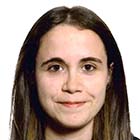
Mercedes Santiago Calvo
New Isocyanate Free Polyurethane Foams Based On Cyclic Triscarbonates And Diamines
Abstract: Polyurethane (PU) foams are the most extensively used and well-known cellular polymers, representing more than half of the global market of foams, with a sustained growth over the years. The chemistry participating in the synthesis of the PU foams is principally focused on the isocyanate reactions and thus the isocyanates compounds are crucial raw materials to develop the complex structure of the PU polymers. Nevertheless, the most important commercial method for isocyanate production based on the phosgenation of amines has a huge health problem, since the exposure to the phosgene used that is a highly toxic gas can cause severe respiratory effects, ocular irritation and burns to the eye and to the skin, and eventually to death [3]. Moreover, the isocyanates monomers also are toxic. Therefore, nowadays many studies are dedicated to research isocyanate free PU foams to prevent special safety, health, and handling precautions and to achieve the challenges of green chemistry.
In this investigation, we study the synthesis of new isocyanate-free PU foams from the reaction between cyclic carbonates and diamines. Fundamentally, trimethylolpropane tris-carbonate is cured with hexamethylene diamine in presence of the chemical and physical blowing agents. The foaming parameters are evaluated to optimize the characteristics of the resulting isocyanate-free polyurethane foams.
Biography: Mercedes Santiago-Calvo graduated in Chemistry at the University of Valladolid in 2011. After that, she studied the Master's degree in Synthetic and Industrial Chemistry organized by the Public University of Navarre, the University of Valladolid and the University of the Basque Country. In 2019, she finished her PhD thesis in Physics at the Cellular Materials Laboratory (CellMat) of the University of Valladolid, under the supervision of Professors Miguel Ángel Rodríguez-Pérez and Fernando Villafañe. Her thesis was focused on the study of the thermoset polyurethane foams from a chemical point of view to understand and optimize its final properties. Currently, she continues her investigations in CellMat as a Postdoctotal Researcher.









.jpg)
.jpg)
.jpg)

.jpg)

